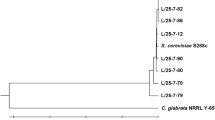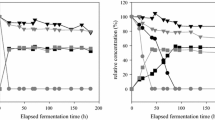Abstract
Despite the fact that yeast Saccharomyces cerevisiae is by far the most commonly used in ethanol fermentation, few have been reported to be resistant to high ethanol concentrations at high temperatures. Hence, in this study, 150 S. cerevisiae strains from the Thailand Bioresource Research Center (TBRC) were screened for ethanol production based on their glucose utilization capability at high temperatures. Four strains, TBRC 12149, 12150, 12151, and 12153, exhibited the most outstanding ethanol production at high temperatures in shaking-flask culture. Among these, strain TBRC 12151 demonstrated a high ethanol tolerance of up to 12% at 40 °C. Compared to industrial and laboratory strains, TBRC 12149 displayed strong sucrose fermentation capacity whereas TBRC 12153 and 12151, respectively, showed the greatest ethanol production from molasses and cassava starch hydrolysate at high temperatures in shaking-flask conditions. In 5-L batch fermentation, similarly to both industrial strains, strain TBRC 12153 yielded an ethanol concentration of 66.5 g L−1 (58.4% theoretical yield) from molasses after 72 h at 40 °C. In contrast, strain TBRC12151 outperformed other industrial strains in cell growth and ethanol production from cassava starch hydrolysis at 40 °C with an ethanol production of 65 g L−1 (77.7% theoretical yield) after 72 h. Thus, the thermotolerant and ethanol-tolerant S. cerevisiae TBRC 12151 displayed great potential and possible uses as an alternative strain for industrial ethanol fermentation using cassava starch hydrolysate.




Similar content being viewed by others
Data availability
All data generated or analysed during this study are included in this article and its supplementary information files.
References
Abdel-Banat BMA, Hoshida H, Ano A, Nonklang S, Akada R (2010) High-temperature fermentation: how can processes for ethanol production at high temperatures become superior to the traditional process using mesophilic yeast? Appl Microbiol Biotechnol 85(4):861–867
Abdel-Fattah WR, Fadil M, Nigam P, Banat IM (2000) Isolation of thermotolerant ethanologenic yeasts and use of selected strains in industrial scale fermentation in an Egyptian distillery. Biotechnol Bioeng 68(5):531–535
Aldiguier AS, Alfenore S, Cameleyre X, Goma G, Uribelarrea JL, Guillouet SE, Molina-Jouve C (2004) Synergistic temperature and ethanol effect on Saccharomyces cerevisiae dynamic behaviour in ethanol bio-fuel production. Bioprocess Biosyst Eng 26(4):217–222
Arora R, Behera S, Kumar S (2015) Bioprospecting thermophilic/thermotolerant microbes for production of lignocellulosic ethanol: a future perspective. Renew Sust Energ Rev 51:699–717
Banat IM, Nigam P, Singh D, Marchant R, McHale AP (1998) Review: ethanol production at elevated temperatures and alcohol concentrations: part I—yeasts in general. World J Microbiol Biotechnol 14(6):809–821
Cabañas KT, Peña-Moreno IC, Parente DC, García AB, Gutiérrez RG, de Morais Jr MA (2019) Selection of Saccharomyces cerevisiae isolates for ethanol production in the presence of inhibitors. 3 Biotech 9(1):6
Chi Z, Arneborg N (2000) Saccharomyces cerevisiae strains with different degrees of ethanol tolerance exhibit different adaptive responses to produced ethanol. J Ind Microbiol Biotechnol 24(1):75–78
Choi G-W, Um H-J, Kim Y, Kang H-W, Kim M, Chung B-W, Kim Y-H (2010) Isolation and characterization of two soil derived yeasts for bioethanol production on cassava starch. Biomass Bioenergy 34(8):1223–1231
da Silva Filho EA, de Melo HF, Antunes DF, Santos SKBd, Resende AdM, Simões DA, de Morais Jr MA (2005) Isolation by genetic and physiological characteristics of a fuel-ethanol fermentative Saccharomyces cerevisiae strain with potential for genetic manipulation. J Ind Microbiol Biotechnol 32(10):481–486
Della-Bianca BE, Gombert AK (2013) Stress tolerance and growth physiology of yeast strains from the Brazilian fuel ethanol industry. Antonie Van Leeuwenhoek 104(6):1083–1095
Díaz-Nava LE, Montes-Garcia N, Domínguez JM, Aguilar-Uscanga MG (2017) Effect of carbon sources on the growth and ethanol production of native yeast Pichia kudriavzevii ITV-S42 isolated from sweet sorghum juice. Bioprocess Biosyst Eng 40(7):1069–1077
Ding J, Huang X, Zhang L, Zhao N, Yang D, Zhang K (2009) Tolerance and stress response to ethanol in the yeast Saccharomyces cerevisiae. Appl Microbiol Biotechnol 85(2):253–263
Favaro L, Jansen T, van Zyl WH (2019) Exploring industrial and natural Saccharomyces cerevisiae strains for the bio-based economy from biomass: the case of bioethanol. Crit Rev Biotechnol 39:800–816
Hamouda HI, Nassar HN, Madian HR, Abu Amr SS, El-Gendy NS (2015) Response surface optimization of bioethanol production from sugarcane molasses by Pichia veronae strain HSC-22. Biotechnol Res Int 2015:905792
Kaewkrajaya C, Dethoupb T, Limtong S (2014) Ethanol production from cassava using a newly isolated thermotolerant yeast strain. ScienceAsia 40:268–277
Kitichantaropas Y, Boonchird C, Sugiyama M, Kaneko Y, Harashima S, Auesukaree C (2016) Cellular mechanisms contributing to multiple stress tolerance in Saccharomyces cerevisiae strains with potential use in high-temperature ethanol fermentation. AMB Expr 6(1):107
Kwon Y-J, Ma A-Z, Li Q, Wang F, Zhuang G-Q, Liu C-Z (2011) Effect of lignocellulosic inhibitory compounds on growth and ethanol fermentation of newly-isolated thermotolerant Issatchenkia orientalis. Bioresour Technol 102(17):8099–8104
Leonel L, Arruda P, Chandel A, Felipe M, Sene L (2021) Kluyveromyces marxianus: a potential biocatalyst of renewable chemicals and lignocellulosic ethanol production. Crit Rev Biotechnol 41(8):1131–1152
Limtong S, Sringiew C, Yongmanitchai W (2007) Production of fuel ethanol at high temperature from sugar cane juice by a newly isolated Kluyveromyces marxianus. Bioresour Technol 98(17):3367–3374
Ma M, Liu ZL (2010) Mechanisms of ethanol tolerance in Saccharomyces cerevisiae. Appl Microbiol Biotechnol 87(3):829–845
Mohd Azhar SH, Abdulla R, Jambo SA, Marbawi H, Gansau JA, Mohd Faik AA, Rodrigues KF (2017) Yeasts in sustainable bioethanol production: a review. Biochem Biophys Rep 10:52–61
Mukherjee V, Steensels J, Lievens B, Van de Voorde I, Verplaetse A, Aerts G, Willems KA, Thevelein JM, Verstrepen KJ, Ruyters S (2014) Phenotypic evaluation of natural and industrial Saccharomyces yeasts for different traits desirable in industrial bioethanol production. Appl Microbiol Biotechnol 98:9483–9498
Nguyen TLT, Gheewala SH, Garivait S (2007) Full chain energy analysis of fuel ethanol from cassava in Thailand. Environ Sci Technol 41(11):4135–4142
Nonklang S, Abdel-Banat Babiker MA, Cha-aim K, Moonjai N, Hoshida H, Limtong S, Yamada M, Akada R (2008) High-temperature ethanol fermentation and transformation with linear DNA in the thermotolerant yeast Kluyveromyces marxianus DMKU3-1042. Appl Environ Microbiol 74(24):7514–7521
Pattanakittivorakul S, Lertwattanasakul N, Yamada M, Limtong S (2019) Selection of thermotolerant Saccharomyces cerevisiae for high temperature ethanol production from molasses and increasing ethanol production by strain improvement. Antonie Van Leeuwenhoek 112(7):975–990
Prado CD, Mandrujano GPL, Souza JP, Sgobbi FB, Novaes HR, da Silva JPMO, Alves MHR, Eliodório KP, Cunha GCG, Giudici R, Procópio DP, Basso TO, Malavazi I, Cunha AF (2020) Physiological characterization of a new thermotolerant yeast strain isolated during Brazilian ethanol production, and its application in high-temperature fermentation. Biotechnol Biofuels 13:178
Prateep Na Talang R, Sirivithayapakorn S (2020) Environmental impacts and economic benefits of different wastewater management schemes for molasses-based ethanol production: a case study of Thailand. J Clean Prod 247:119141
Saini P, Beniwal A, Kokkiligadda A, Vij S (2018) Response and tolerance of yeast to changing environmental stress during ethanol fermentation. Process Biochem 72:1–12
Sárvári Horváth I, Franzén CJ, Taherzadeh MJ, Niklasson C, Lidén G (2003) Effects of furfural on the respiratory metabolism of Saccharomyces cerevisiae in glucose-limited chemostats. Appl Environ Microbiol 69(7):4076–4086
Sorapipatana C, Yoosin S (2011) Life cycle cost of ethanol production from cassava in Thailand. Renew Sust Energ Rev 15(2):1343–1349
Stanley D, Fraser S, Chambers PJ, Rogers P, Stanley GA (2010) Generation and characterisation of stable ethanol-tolerant mutants of Saccharomyces cerevisiae. J Ind Microbiol Biotechnol 37(2):139–149
Sthiannopkao S (2002) Ethanol production technology in Thailand. Asian J Energy Environ 3:27–51
Taherzadeh MJ, Gustafsson L, Niklasson C, Lidén G (2000) Physiological effects of 5-hydroxymethylfurfural on Saccharomyces cerevisiae. Appl Microbiol Biotechnol 53(6):701–708
Techaparin A, Thanonkeo P, Klanrit P (2017) High-temperature ethanol production using thermotolerant yeast newly isolated from Greater Mekong Subregion. Braz J Microbiol 48(3):461–475
Teixeira MC, Raposo LR, Mira NP, Lourenço AB, Sá-Correia I (2009) Genome-wide identification of Saccharomyces cerevisiae genes required for maximal tolerance to ethanol. Appl Environ Microbiol 75(18):5761–5772
Wang L, Li B, Wang S-P, Xia Z-Y, Gou M, Tang Y-Q (2021) Improving multiple stress-tolerance of a flocculating industrial Saccharomyces cerevisiae strain by random mutagenesis and hybridization. Process Biochem 102:275–285
Yu C-Y, Jiang B-H, Duan K-J (2013) Production of bioethanol from carrot pomace using the thermotolerant yeast Kluyveromyces marxianus. Energies 6(3):1794–1801
Yuangsaard N, Yongmanitchai W, Yamada M, Limtong S (2013) Selection and characterization of a newly isolated thermotolerant Pichia kudriavzevii strain for ethanol production at high temperature from cassava starch hydrolysate. Antonie Van Leeuwenhoek 103(3):577–588
Acknowledgements
WK is thankful to the Postdoctoral Research Fellowship from National Center for Genetic Engineering and Biotechnology (BIOTEC). We are grateful to Dr. Philip J. Shaw for critically editing the manuscript.
Funding
This work was supported by BIOTEC (Grant numbers: P-18-52414 and P-19-52258).
Author information
Authors and Affiliations
Corresponding author
Ethics declarations
Conflict of interest
The authors declare that they have no conflict of interest in the publication.
Ethical statements
This article does not contain any studies with human participants or animals performed by any of the authors.
Supplementary Information
Below is the link to the electronic supplementary material.
Rights and permissions
Springer Nature or its licensor (e.g. a society or other partner) holds exclusive rights to this article under a publishing agreement with the author(s) or other rightsholder(s); author self-archiving of the accepted manuscript version of this article is solely governed by the terms of such publishing agreement and applicable law.
About this article
Cite this article
Kruasuwan, W., Puseenam, A., Am-in, S. et al. Evaluation of thermotolerant and ethanol-tolerant Saccharomyces cerevisiae as an alternative strain for bioethanol production from industrial feedstocks. 3 Biotech 13, 23 (2023). https://doi.org/10.1007/s13205-022-03436-4
Received:
Accepted:
Published:
DOI: https://doi.org/10.1007/s13205-022-03436-4




